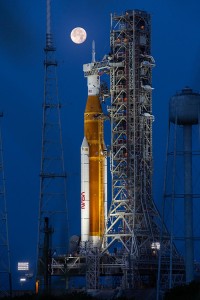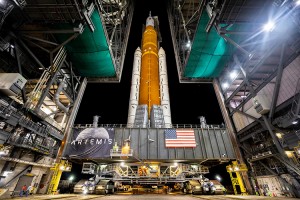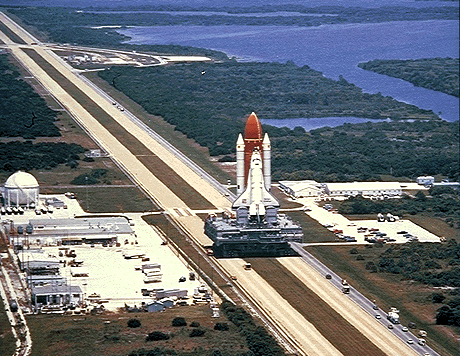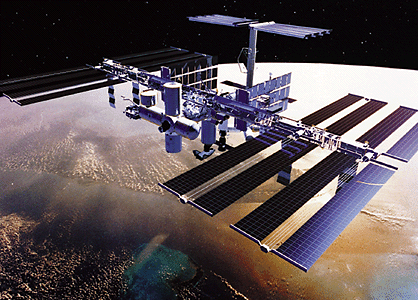NASA Launches Artemis to the Moon with Eyes on Mars
Wednesday, November 16th, 2022
The Artemis I Space Launch System (SLS) and Orion spacecraft at NASA’s Kennedy Space Center on June 14, 2022.
Credit: KSC/NASA
The National Aeronautics and Space Administration is one step closer to getting astronauts back on the moon after the Artemis-1 mission launch today, November 16th, 2022. Artemis-1 is the first mission in the three-ply plan to establish a better understanding of the moon en route to landing on Mars. The un-crewed Orion spacecraft will be launched from NASA’s Kennedy Space Center in Florida, on the Space Launch System rocket, NASA’s newest and most powerful rocket. The mission has been delayed due to Hurricane Ian and tropical storm Nicole.
The program is named after Artemis, the goddess of hunting and the moon in Greek mythology. Artemis was the twin of Apollo, the god of light. The Apollo program was NASA’s first mission to land on the moon. The Orion spacecraft is named after Orion, a handsome and energetic hunter in Greek mythology. He was a giant who could walk through the sea and on its surface. In one myth, Artemis set Orion in the sky as a constellation after his death. Orion the Hunter, is a brilliant constellation that includes two of the brightest stars in the sky.
The mission is set to send Orion beyond the moon, launching it into orbit around the moon, before returning to Earth. Orion will travel 1.3 million miles (2.1 million kilometers) over the course of 42 days while orbiting the moon. Orion’s return to Earth will be the fastest and hottest planned spacecraft return in history. It is expected to land in the Pacific Ocean near San Diego, California, on Oct. 10. The Orion spacecraft is planned to carry astronauts to the International Space Station and, eventually, to the moon and Mars. The craft is designed to sustain astronauts during a long mission into deep space and return them safely to Earth.

NASA’s Space Launch System (SLS) rocket and Orion spacecraft roll out to the Launch Complex on Aug. 16, 2022, ahead of the scheduled launch of the Artemis 1 mission on Aug. 29, 2022.
Although on this trip, Orion is heading into space without passengers. the Orion spacecraft has many advanced features to support an astronaut crew on an extended mission into space. These features include unique systems for propulsion and flight control. Astronauts will be carried in Orion’s Crew Exploration Vehicle (CEV). The CEV is equipped with advanced heat shields to withstand the temperatures generated by the high velocities required to launch the craft into deep space and to reenter Earth’s atmosphere upon return. Orion cannot make it to space on its own, it requires a push from a heavy-lift rocket. That is where the Space Launch System (SLS) helps out. The SLS uses solid-fuel rocket boosters to carry heavy loads into space. The SLS is the most powerful rocket ever built for launching a space exploration vehicle.
The first successful unpiloted test flight of the Orion spacecraft took place in 2014. The Orion CEV was launched on an older model Delta IV heavy rocket and orbited Earth twice before it splashed down and was recovered in the Pacific Ocean. A second test flight, in 2018, also used the Delta IV heavy rocket because of delays in the development of the SLS. Future unpiloted test flights are planned to test various components of the Orion spacecraft. Orion missions with astronauts are expected to take place later, in the 2020’s. The last manned mission to the moon was in 1972 when the Apollo 17 mission completed the longest lunar landing.




